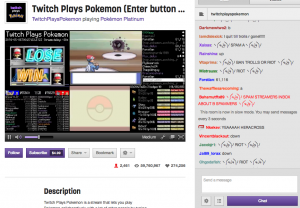Something I’ve been fascinated with this semester is the Twitch Plays Pokemon phenomenon.

Twitch Plays Pokemon (http://www.twitch.tv/twitchplayspokemon) started out as the original Pokemon Red game, a single player game from the 90s built for the GameBoy. An emulator of the game was hosted on the Twitch website, and accepted commands (A, B, Start, left, right etc) from a text entry box that any users could connect to. As such, it was a single player game run by thousands and thousands of concurrent players; somehow, despite thousands of “trolls” and an inability to directly plan gameplay, the users won the game after 16 days.
I’ve studied the game as part of my work for Social and Organizational Issues of Information, and it is pretty remarkable. It shows what can be achieved without any mechanisms for feedback- for instance, users don’t know whether there command got chosen or not for any “move” (e.g. if the character moved left, was it because they typed “left” or because of someone else). And the likelihood of any single user having an impact on the actual gameplay is minimal. Yet hundreds of thousands of people played.
We’ve talked a lot about these issues in a variety of ways, from gamification to peer pressure to the build/fight/unite framework for getting teams to achieve their utmost. But I think we can learn two things from Twitch Plays Pokemon.
First, that online forums for communication and collaboration are still new, and we haven’t yet reached the limits of their designs. While enterprise knowledge exchange systems, wikis and peer annotation seem like they have been around forever, in fact they are just some of the first developments for online collaboration. People will continue to develop more and more creative ways for online socializing and online collaboration, and these tools may ultimately be more effective for changing behaviors or achieving extraordinary results than anything we have currently designed. We should continue to push the envelope with what is possible.
Secondly, Twitch Plays Pokemon lays out some of the assumptions we bring to the table when we think about collaborative achievement as part of a team or social group. The system affords no feedback to users, no leaderboard, no positive reinforcement. It is bare bones. However, users still flocked to it. The likely cause is threefold- first, that it was an unique system, second that the game chosen had a particularly enthusiastic fan base, and third that it gained significant media attention. Whatever the reasons, it shows that when evaluating how to achieve extraordinary results (I consider a hundred thousand people defeating a single player game without speaking to each other directly extraordinary) we should be willing to consider the absurd.